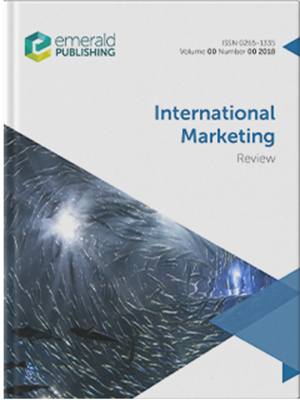国际危机中的敌意、偏好冲突与消费语境:规范影响视角
IF 4.6
3区 管理学
Q1 BUSINESS
引用次数: 0
摘要
目的传统的敌意研究由于忽略了社会影响,未能充分考虑消费语境。为了解决这一局限性,本研究包括两个相互关联的部分:(a)调查规范性影响(价值表达和功利性影响)如何塑造消费者的敌意态度和购买意图;以及(b)建立在规范影响视角的基础上,将消费环境分为购买(在线与离线)和使用(私人与公共)环境。目的是考察在偏好冲突的条件下,不同行为暴露程度的消费情境如何影响购买决策。设计/方法/方法进行了一次预测试、一次调查和一次实验,以实证验证所提出的研究模型。发现在国际危机中,消费者的态度和行为是由社会决定的。此外,私人使用的在线购买(公共使用的离线购买)条件导致最高(最低)水平的购买意愿。独创性/价值这项研究开创了敌意文献的先河,以确定在情境性国际危机中发生偏好冲突的可能性,并更微妙地将传统消费背景分为购买和使用背景。本文章由计算机程序翻译,如有差异,请以英文原文为准。
Animosity, preference conflict and consumption context in an international crisis: a normative influence perspective
PurposeBecause of its omission of social influences, conventional animosity research has failed to sufficiently consider consumption context. To address this limitation, this research constitutes two interrelated parts: (a) investigating how normative influences (value-expressive and utilitarian influences) shape consumers’ animosity attitudes and purchase intentions; and (b) building on the normative influence perspective and separating consumption context into purchase (online vs. offline) and usage (private vs. public) contexts. The goal was to examine under the condition of preference conflict, how consumption contexts with different degrees of behavioral exposure affect purchase decisions.Design/methodology/approachOne pretest, one survey and one experiment were conducted to empirically validate the proposed research model.FindingsIn an international crisis, consumers’ attitudes and behaviors were socially determined. Moreover, the online purchase with private usage (offline purchase with public usage) condition resulted in the highest (lowest) level of purchase intention.Originality/valueThis research pioneers in the animosity literature to identify the possibility of preference conflict in a situational international crisis, and to more delicately separate the conventional consumption context into purchase and usage contexts.
求助全文
通过发布文献求助,成功后即可免费获取论文全文。
去求助
来源期刊

International Marketing Review
BUSINESS-
CiteScore
8.70
自引率
12.00%
发文量
55
期刊介绍:
International Marketing Review (IMR) is a journal that has, as its core remit, the goal of publishing research that pushes back the boundaries of international marketing knowledge. IMR does this by publishing novel research ideas, and by publishing papers that add substance to, question the basic assumptions of, reframe, or otherwise shape what we think we know within in the international marketing field. IMR is pluralistic, publishing papers that are conceptual, quantitative-empirical, or qualitative-empirical. At IMR, we aim to be a journal that recognizes great papers and great research ideas, and works hard with authors to nurture those ideas through to publication. We aim to be a journal that is proactive in developing the research agenda in international marketing, by identifying critical research issues, and promoting research within those areas. Finally, IMR is a journal that is comfortable exploring, and that fosters the exploration of, the interfaces and overlaps between international marketing and other business disciplines. Where no interfaces or overlaps exist, IMR will be a journal that is ready to create them. IMR’s definition of international marketing is purposefully broad and includes, although is not restricted to: -International market entry decisions and relationships; -Export marketing and supply chain issues; -International retailing; -International channel management; -Consumer ethnocentrism, country and product image and origin effects; -Cultural considerations in international marketing; -International marketing strategy; -Aspects of international marketing management such as international branding, advertising and new product development.
 求助内容:
求助内容: 应助结果提醒方式:
应助结果提醒方式:


